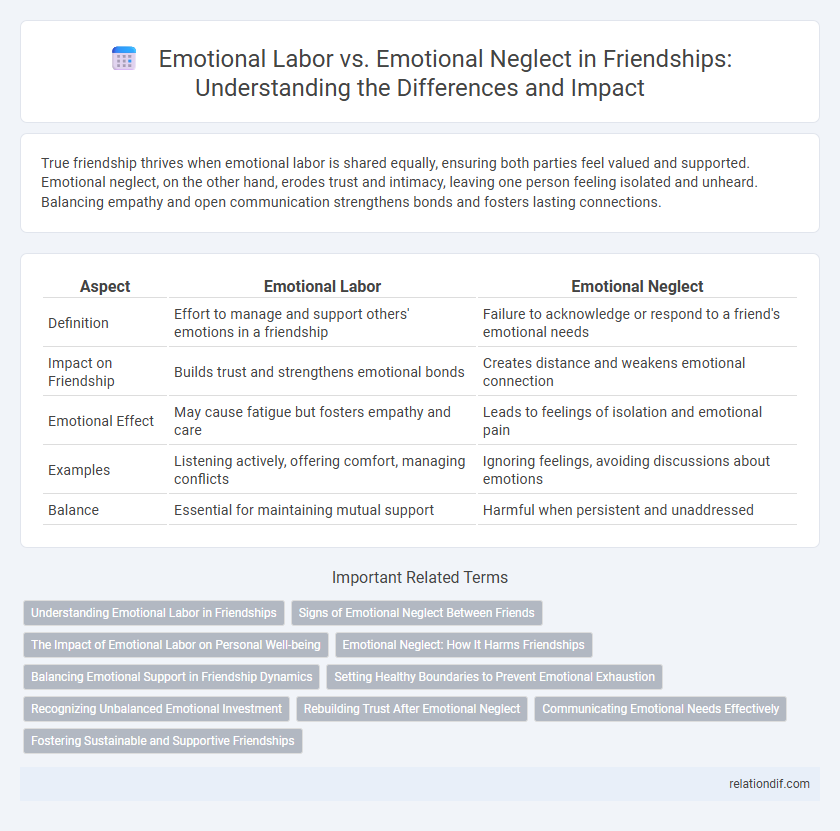True friendship thrives when emotional labor is shared equally, ensuring both parties feel valued and supported. Emotional neglect, on the other hand, erodes trust and intimacy, leaving one person feeling isolated and unheard. Balancing empathy and open communication strengthens bonds and fosters lasting connections.
Table of Comparison
| Aspect | Emotional Labor | Emotional Neglect |
|---|---|---|
| Definition | Effort to manage and support others' emotions in a friendship | Failure to acknowledge or respond to a friend's emotional needs |
| Impact on Friendship | Builds trust and strengthens emotional bonds | Creates distance and weakens emotional connection |
| Emotional Effect | May cause fatigue but fosters empathy and care | Leads to feelings of isolation and emotional pain |
| Examples | Listening actively, offering comfort, managing conflicts | Ignoring feelings, avoiding discussions about emotions |
| Balance | Essential for maintaining mutual support | Harmful when persistent and unaddressed |
Understanding Emotional Labor in Friendships
Understanding emotional labor in friendships involves recognizing the effort one invests in supporting a friend's feelings, managing conflicts, and maintaining trust. Emotional neglect occurs when this supportive effort is consistently unreciprocated, leading to imbalance and potential relational strain. Prioritizing open communication and empathy helps sustain healthy, mutually nurturing friendships.
Signs of Emotional Neglect Between Friends
Signs of emotional neglect between friends include consistent lack of support during difficult times, minimal engagement or interest in each other's feelings, and frequent dismissiveness of emotional needs. When one friend regularly feels unheard or invalidated, it undermines trust and deepens emotional distance. This neglect contrasts with emotional labor, where friends actively invest in understanding and responding to each other's emotional experiences.
The Impact of Emotional Labor on Personal Well-being
Emotional labor in friendship involves managing and regulating feelings to support others, often leading to stress and burnout when unreciprocated. Consistently prioritizing friends' emotional needs without adequate self-care results in diminished personal well-being and increased vulnerability to anxiety and depression. Balancing emotional investment is crucial to maintaining mental health and sustaining healthy, supportive friendships.
Emotional Neglect: How It Harms Friendships
Emotional neglect in friendships occurs when essential emotional support and validation are consistently absent, causing feelings of isolation and decreased trust. This subtle form of emotional harm undermines the bond, leading to misunderstandings and resentment that impair communication. Over time, untreated emotional neglect can erode the foundation of a friendship, resulting in emotional distance and eventual disconnection.
Balancing Emotional Support in Friendship Dynamics
Balancing emotional support in friendship dynamics requires recognizing when emotional labor becomes overwhelming, risking burnout and resentment. Providing consistent empathy and active listening strengthens trust while avoiding emotional neglect, which can lead to feelings of isolation and disconnection. Establishing clear boundaries and open communication ensures mutual support that nurtures a healthy, reciprocal friendship.
Setting Healthy Boundaries to Prevent Emotional Exhaustion
Setting healthy boundaries in friendships is crucial to balancing emotional labor and preventing emotional neglect. Clearly communicating limits helps avoid overextending oneself while ensuring both parties receive mutual support and empathy. Prioritizing self-care and honest dialogue fosters sustainable relationships free from emotional exhaustion.
Recognizing Unbalanced Emotional Investment
Unbalanced emotional investment in friendship often manifests when one person consistently bears the emotional labor, providing support, empathy, and understanding, while the other neglects their emotional contributions. Recognizing signs such as recurring feelings of exhaustion, resentment, or emotional depletion indicates emotional neglect by one party. Addressing these imbalances is crucial for maintaining mutual respect and emotional health in long-term friendships.
Rebuilding Trust After Emotional Neglect
Rebuilding trust after emotional neglect in friendship requires consistent emotional labor, including active listening, empathy, and open communication to validate feelings and demonstrate reliability. Repairing the emotional breach involves acknowledging past neglect, expressing genuine remorse, and creating a safe space for vulnerability to restore connection. Fostering patience and persistence in addressing emotional wounds strengthens trust and reinforces mutual support.
Communicating Emotional Needs Effectively
Effective communication of emotional needs plays a crucial role in maintaining healthy friendships by balancing emotional labor and preventing emotional neglect. Friends who openly express their feelings and listen actively foster mutual understanding and support, reducing the burden of unspoken expectations. Clear communication helps identify when emotional labor is being unevenly distributed, promoting fairness and strengthening relational resilience.
Fostering Sustainable and Supportive Friendships
Fostering sustainable and supportive friendships requires balancing emotional labor and avoiding emotional neglect by maintaining consistent empathy, active listening, and mutual care. Prioritizing open communication and healthy boundaries prevents emotional exhaustion while ensuring that both friends feel valued and understood. Sustainable friendships thrive on reciprocal emotional investment, promoting resilience and long-term connection.
Emotional labor vs Emotional neglect Infographic

 relationdif.com
relationdif.com